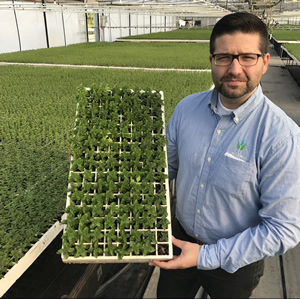AI Enhancing Nanotechnology in Agriculture: A Leap Forward in Sustainable Farming
.jpg)
The integration of Artificial Intelligence (AI) into nanotechnology is revolutionizing agriculture, offering unprecedented opportunities to enhance crop productivity, pest control, and environmental sustainability. This synergy is rapidly emerging as a game-changer, leveraging the power of AI to optimize the use of nanotechnology in farming practices.
Understanding the Convergence of AI and Nanotechnology in Agriculture
Nanotechnology involves the manipulation of matter at an atomic or molecular scale to create new materials and devices. In agriculture, it's used for various purposes, including the delivery of pesticides and fertilizers more effectively and the creation of sensors for soil health monitoring. The integration of AI into these nanotech applications enables smarter, more efficient, and more environmentally friendly farming methods.
Precision Agriculture: AI-Driven Nanosensors for Soil and Crop Health
One of the most significant applications of AI in nanotechnology within agriculture is in the development of nanosensors. These tiny sensors can monitor soil conditions, such as moisture levels, nutrient content, and pH balance, with unprecedented precision. AI algorithms analyze this data, allowing farmers to make informed decisions about irrigation, fertilization, and harvesting. This level of precision agriculture not only enhances crop yields but also significantly reduces resource waste, contributing to more sustainable farming practices.
Enhanced Pest Control and Disease Management
AI and nanotechnology are also transforming pest control and disease management in agriculture. Nanotechnology enables the development of targeted pesticide delivery systems, which can release pesticides in response to specific environmental triggers or pest presence. AI complements this by predicting pest outbreaks and identifying disease patterns, allowing for timely and precise intervention. This targeted approach not only increases the efficacy of pest control but also minimizes the environmental impact by reducing the overall use of chemicals.
Boosting Fertilizer Efficiency with Nanotechnology
Fertilizer overuse is a major environmental concern in modern agriculture. Nanotechnology offers a solution through the development of nano-fertilizers, which are more readily absorbed by plants due to their small size. AI enhances this by analyzing soil and crop data to determine the optimal type and amount of fertilizer needed, minimizing waste and environmental runoff. This smarter approach to fertilization not only improves crop yields but also reduces the ecological footprint of farming.
Water Management and Conservation
Water scarcity is a growing global challenge, particularly in agriculture, which is a major consumer of water resources. Nanotechnology can help create more efficient irrigation systems, with nanomaterials that regulate water flow or retention in the soil. AI takes this further by analyzing weather patterns, soil conditions, and plant water needs to optimize irrigation schedules and quantities. This AI-driven approach ensures that crops receive exactly the amount of water they need, reducing water waste and helping in conservation efforts.
Enhancing Food Quality and Safety
The application of AI and nanotechnology in agriculture also extends to improving food quality and safety. Nanotech-based sensors can detect contaminants or pathogens in crops, while AI algorithms can analyze this data to identify potential health risks. This technology not only ensures safer food production but also helps in maintaining higher quality standards, as AI can also monitor and optimize conditions for optimal crop growth and health.
Overcoming Challenges: Ethical and Regulatory Considerations
While the potential of AI and nanotechnology in agriculture is immense, there are challenges to be addressed. Ethical concerns regarding data privacy, especially with AI-driven data collection, and potential health risks associated with nanomaterials, need careful consideration. Additionally, regulatory frameworks governing the use of nanotechnology and AI in agriculture are still evolving and require international cooperation and standardization.
The Future of Farming: AI and Nanotech-Driven Agriculture
 As we look to the future, the convergence of AI and nanotechnology in agriculture holds the promise of creating more sustainable, efficient, and productive farming practices. It represents a significant step towards meeting the growing global food demand while minimizing environmental impact. Continued research and development in this field, coupled with responsible regulatory and ethical approaches, will be key to unlocking the full potential of this technology in transforming agriculture.
As we look to the future, the convergence of AI and nanotechnology in agriculture holds the promise of creating more sustainable, efficient, and productive farming practices. It represents a significant step towards meeting the growing global food demand while minimizing environmental impact. Continued research and development in this field, coupled with responsible regulatory and ethical approaches, will be key to unlocking the full potential of this technology in transforming agriculture.
The fusion of AI and nanotechnology is setting a new horizon in agriculture, offering innovative solutions to age-old challenges. At Nano-Yield, we have successfully deployed AI to enhance crop productivity, optimize resource use, and reduce environmental impacts. This technology is paving the way for a more sustainable and efficient future in farming. As we continue to embrace and develop these technologies, we edge closer to a world where agricultural practices are not only productive but also harmonious with the environment.
Comments (0)
This post does not have any comments. Be the first to leave a comment below.
Featured Product

